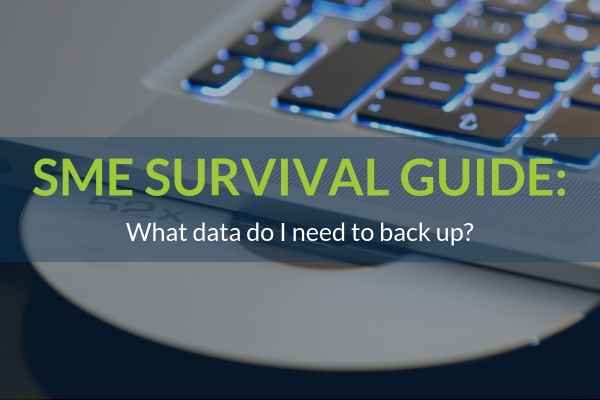SME survival guide: What data do I need to back up?
Whether big or small, all businesses know that the data they store is crucial for communicating with people – including employees, stakeholders, potential customers and more, who are vital in helping them successfully fulfil their company activities and objectives.
Given that between 60% and 90% of organisations fail after a security breach or data loss – and with plenty in the news about GDPR fines – it’s never been more ingrained in the minds of SME owners, that copies of this data need to be regularly saved somewhere safe. This is not only to help prevent any information being compromised in a cyber-attack, but also to enable rapid recovery in the event of a power outage or natural disaster, for example.
We’ve talked about the importance of back-up and data replication before, but how do you know exactly what kind of files you need to duplicate, how to do it and when?
Can’t I just back it all up?
You may be thinking this is an easy question that requires a one-word response, but in line with the GDPR that came into effect in May 2018, there are new rules around the way organisations can collect, save and store data. So, if you thought that ‘yes’ was the answer to the question above, you’re not wrong – but it’s worth being aware that under the new legislation, everyone whose personally identifiable data you hold must have consented to you keeping it.
Therefore, only acquiring and processing data which is necessary is a key element to helping create a data back-up strategy that’s as slick as possible.
Ok, so what do I back up?
Unfortunately, there’s no one-size-fits-all approach when it comes to deciding exactly what data needs to be backed up, but any information that is essential for keeping your business running should definitely be on the list. For example, this could be anything from customer details, financial records and accounting information, to stakeholder contacts and company emails, to name but a few.
Just remember, once you’ve established consent for the data you need to run your businesses successfully, this then needs to be copied and saved on a habitual basis.
How should I do it?
There are many ways to back up your SME’s sensitive data, but the most effective and comprehensive way of ensuring that no information is lost forever, is to implement a 3-2-1 back-up strategy.
Put simply, this approach ensures there are three copies of the data, on two separate media types – one of which is stored off-site. An encrypted, cloud-based option offers an improved level of security – compared to physical servers and manual replication processes – so it may be worth investing in the cloud as a key part of your recovery procedure.
The cloud is not only a great alternative to more traditional back-up methods – as it saves on software and hardware costs, as well as increasing security – but its flexibility means that data stored on it can be accessed from anywhere, inside the office and beyond.
When is the best time?
Again, this is entirely subjective to the business in question. But as a general rule, whenever any critical data changes, then it’s a smart idea to ensure it’s backed up appropriately.
To ensure that there’s never a gap in your data back-ups, it’s advisable to assess your requirements and ask yourself key questions – such as, how much email loss would affect your business operations, or what impact a sales system restoration would have on daily tasks. Only then can you determine the frequency which would best suit your SME.
If you’re unsure on how to implement the best back-up solution for your SME, why not get in touch with our team of IT experts?



